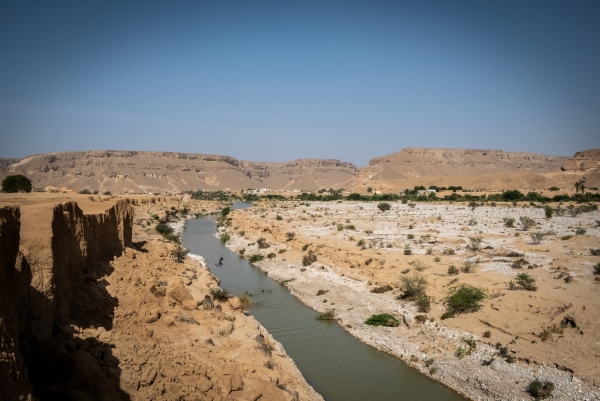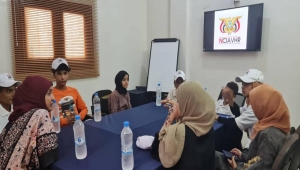
[ Photo published by a French magazine for the black waters of Yemen ]
L’OBS French journal investigation was shocking regarding the huge pollution caused by Total company in Yemen. It contains data and facts that the company remain under cover, which caused the biggest environmental disaster in Yemen, among a local droopy government and a country fragile situation.
“Almawqea Post” was the first Yemeni website that dealt with the content of the French journal into Arabic. To complete shedding light on that, Almawqea Post made a dialogue via WhatsApp with the author of the investigation “Quentin Muller”, French, who recently visited Yemen, was able to reveal the huge anarchy made by Total in the Yemeni eastern provinces.
Muller talked about his journalistic experience, Yemen, the official entities, and the Total environmental disaster. Here, we thank him for responding to making this short dialogue through which he reveals many facts and lessons. By the way, we’ve approached Total for inquiries regarding the investigation content, but the rather referred to the company response provided to the French journal, refused to comment.
* Is it possible to summarize the most prominent notes, you’ve reached to in your investigation, to the Yemeni reader regarding the Total Co. caused pollution in Yemen?
**From 1996 to 2015, Total had built some very archaic illegal installations, out of international standards. They are dangerous for health and environment too. They were hundreds of holding ponds to dry the produced water. So that all chemicals were flying in the atmosphere and then stayed at the bottom of those holding ponds as toxic mud. I’ve watched from a satellite view, all the mud that staying in those holding ponds by Total. So all remaining were either flying with winds, or discharged by floods and rains. We can say that all around valleys may be contaminated! Furthermore, they put billions of litres of this produced water in some old and empty oil wells which are very dangerous and criminal because it can leak into many aquifers that Yemenis drink from. Because after a while, oils wells are no longer waterproof.
*There is a reply from Total responding to your investigation content that was published at the company website. How do you assess this response; was the company accurate and honest in that reply, or what’s exactly?
Those answers come from my questions sent to them last February. Most of their answers are lies but in some, they are forced to admit, like that they’ve never built a factory to clean the produced water that came out from the wells with oil. This must be the international standards and they didn't deny it. Also they didn't deny that all those holding ponds full of toxic water were dangerous for the people around. They also didn’t deny that they were out of the international standards. Why Total didn't build oil installations respectful to the environment and the health of Yemenis? Are Yemeni lives have no value for them?
*Are there any responses regarding the investigation within France and on decision makers in Paris?
For now, some politicians from left side reacted and asked for an international investigation on the potentiel crimes of Total in Yemen. But Yemeni government has to react too.
* Is it possible to be satisfied with the investigation and the company response only, or there would be a procedural move later, for example raising a lawsuit against the company in Paris?
I came to know that some lawyers already contacted Yemeni victims from Hadramawt of Total’s pollutions. A lawsuit against Total could happen.
* In your opinion, why Total intended to do that; is it escaping responsibility or exploiting the week governmental situation in Yemen, what do you think?
Total exploited the weakness and the corruption of the former Yemeni government to increase its yields and profitability. But this behaviour indirectly killed hundreds of Yemenis.
*How do you explain the Yemeni government attitude towards such an issue, keeping silent about what happened?
Former government of Ali Abdullah Saleh was corrupter and was very clientelist. The Ministry of Oil was controlling and ruling the blocs concession like a random business. Environment and health weren’t at all a preoccupation or even a question. Ministry of Oil and Environment had to work together to impose certain types of installations that respect the health of Hadramis.
* From a legal viewpoint, can affected population in polluted areas raise lawsuits against Total in front of the French judiciary?
**They really can do something because Total did many legal mistakes.
* Total has a bad reputation in Yemen. There are accusations for her to be accomplice in transferring a part of Balhaf institution, was working in, to a military base for the Saudi-led Coalition in Yemen that used as a prison violating human rights. Why do Total deal with Yemen in such a way?
**Total adapts itself to the government they deal with. If the government is weak and is easily corruptible, they behave without any consideration. If the government is strong and has a tight monitoring to their activities, they will do a clean work. In the same time, Total did some good things too for Yemenis, like sending some of them for scholarships in France, developing some areas in Shabwa and Hadramawt, and financing some projects. But this wouldn’t compensate their pollution.
* What are the difficulties faced you while preparing the investigation?
For me, as a French, it was very difficult to get access to Yemen (visa and clearance). I prepared my trip during months to get all this papers. Then, on spot, it was very risky to move and work freely due to being a French, and from slept cells of al-Qaeda could kidnap me. I’m not saying that Yemenis could be a danger for me! Absolutely not. As 99,99% of Yemenis are amazing people, the most welcoming and honest people I’ve ever met. I love Yemen as it is my country. It’s also the most beautiful country in the world. That’s why I’m taking risks and working hard to tell the story and denounce crimes committed to this marvellous country. Yemen is the heart of Arabic world, don’t touch it!
* From your viewpoint, what should be done here to stop or counter the occurrence of such a disaster in the future?
**Ministries of Oil and Environment must work together and concern first of all about the health of its people. They have to monitor activities of foreign oil companies and implement sanctions whenever required. They have to implement law as well to set up boundaries that cannot be violated.
* The Yemeni journalist suffers huge obstacles in preparing such investigations, how could you succeed in preparing and working for such an issue, coming up with such information and documents?
**I’ve been helped by very nice Yemenis, including lawyers who sent me some documents from the Seiyun court. It took a lot of time to collect all of this documents (I started to investigate last September), but was lucky because if some brave Yemenis that sent me all of this information. Then, I had to translate some documents that written in Arabic with an ex Yemeni diplomat that I trust.
* How does the idea of Total caused pollution in Yemen attracted your attention to investigate in?
**End of 2020, I have read an excellent report made by “Sana’a Center” about oil pollution in Hadramawt. I was thinking since years to investigate on this topic and denounce some crimes committed by foreign oil companies in Yemen. At that time, I didn’t know at all that Total was involved. I discovered it by chance, on spot.
* You’ve said in your investigation that you’ve visited Yemen. Is it possible to explain your experience of travelling, moving inside Yemen, and how did you find her? did you find any cooperation from Yemeni entities during your visit?
*The first time I visited Hadramawt was in 2021. I was in transit for one day only to Socotra to the day after. At that time, I was supposed to reach the island of Socotra for couple of months to teach French and write some reports. It was my very first time in Yemen and I was very excited because of the history of this country that amazed me since years. I worked very hard to get the papers/visa to access to it. I remembered, when the plane started to land in Seiyun, I was watching from the windows all this wonderfull landscapes. I was crying of joy along with my ex-wife. We were very emotional. This moment has been of the most beautiful day in my life: landing in Seiyun. After we visited the city and the castle for a night, we flied to Socotra the day after. Few months later, I came back here, but as a journalist, to cover Yemeni matters in Hadramawt, Marib and Aden. It was the quintessence of my work. Working in Yemen as foreign journalist is very hard because you need many authorizations to move in the country while the authority is not helping much to get all access. But some prominent Yemenis helped me such as his excellency Dr. Reyad Yasin, ambassador of Yemen in Paris and Sultan al-Arada. I thank as well Hadrami authorities for letting me landing in Hadramawt.
* What is the lesson that can journalists learn from your investigation and the collected data? What can you advise journalists based on your experience?
**Investigation is like a huge puzzle. You have to take time to collect the pieces and reconstitute the story. You have to doubt as well of every story people telling you without proofs. It’s very important to cross the testimonies to avoid mistakes or propaganda. Anyways, Yemen is full of very skilful journalists like Ali al Sakani or Yahya al-Sewari. Those journalists are models for me.
* It’s notable that there is a big gap between the foreign media dealing with Yemen and the local recipients due to language… etc. for example: the investigation you’ve prepared may be still unknown by many Yemenis, how is it possible to bridge this gap?
**That’s why it was very important for me to translate my investigation into Arabic and publish it on my website with free access for Yemenis. This investigation is dedicated to Yemeni public first of all!
لقراءة المادة باللغة العربية من الرابط هنا
